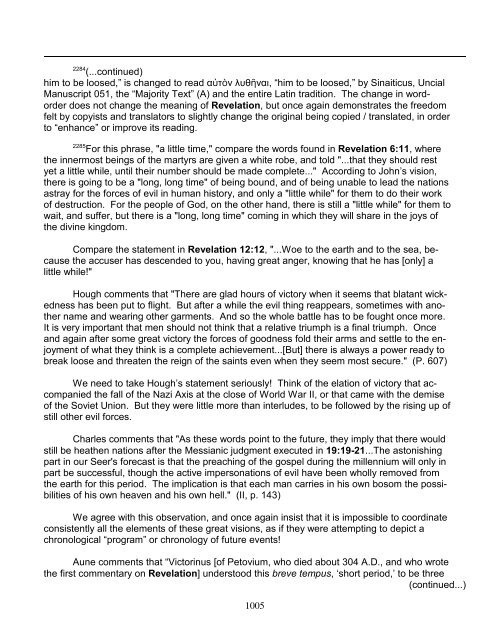Revelation 20 - In Depth Bible Commentaries
Revelation 20 - In Depth Bible Commentaries
Revelation 20 - In Depth Bible Commentaries
Create successful ePaper yourself
Turn your PDF publications into a flip-book with our unique Google optimized e-Paper software.
2284<br />
(...continued)<br />
him to be loosed,” is changed to read áôí ëõèíáé, “him to be loosed,” by Sinaiticus, Uncial<br />
Manuscript 051, the “Majority Text” (A) and the entire Latin tradition. The change in wordorder<br />
does not change the meaning of <strong>Revelation</strong>, but once again demonstrates the freedom<br />
felt by copyists and translators to slightly change the original being copied / translated, in order<br />
to “enhance” or improve its reading.<br />
2285<br />
For this phrase, "a little time," compare the words found in <strong>Revelation</strong> 6:11, where<br />
the innermost beings of the martyrs are given a white robe, and told "...that they should rest<br />
yet a little while, until their number should be made complete..." According to John’s vision,<br />
there is going to be a "long, long time" of being bound, and of being unable to lead the nations<br />
astray for the forces of evil in human history, and only a "little while" for them to do their work<br />
of destruction. For the people of God, on the other hand, there is still a "little while" for them to<br />
wait, and suffer, but there is a "long, long time" coming in which they will share in the joys of<br />
the divine kingdom.<br />
Compare the statement in <strong>Revelation</strong> 12:12, "...Woe to the earth and to the sea, because<br />
the accuser has descended to you, having great anger, knowing that he has [only] a<br />
little while!"<br />
Hough comments that "There are glad hours of victory when it seems that blatant wickedness<br />
has been put to flight. But after a while the evil thing reappears, sometimes with another<br />
name and wearing other garments. And so the whole battle has to be fought once more.<br />
It is very important that men should not think that a relative triumph is a final triumph. Once<br />
and again after some great victory the forces of goodness fold their arms and settle to the enjoyment<br />
of what they think is a complete achievement...[But] there is always a power ready to<br />
break loose and threaten the reign of the saints even when they seem most secure." (P. 607)<br />
We need to take Hough’s statement seriously! Think of the elation of victory that accompanied<br />
the fall of the Nazi Axis at the close of World War II, or that came with the demise<br />
of the Soviet Union. But they were little more than interludes, to be followed by the rising up of<br />
still other evil forces.<br />
Charles comments that "As these words point to the future, they imply that there would<br />
still be heathen nations after the Messianic judgment executed in 19:19-21...The astonishing<br />
part in our Seer's forecast is that the preaching of the gospel during the millennium will only in<br />
part be successful, though the active impersonations of evil have been wholly removed from<br />
the earth for this period. The implication is that each man carries in his own bosom the possibilities<br />
of his own heaven and his own hell." (II, p. 143)<br />
We agree with this observation, and once again insist that it is impossible to coordinate<br />
consistently all the elements of these great visions, as if they were attempting to depict a<br />
chronological “program” or chronology of future events!<br />
Aune comments that “Victorinus [of Petovium, who died about 304 A.D., and who wrote<br />
the first commentary on <strong>Revelation</strong>] understood this breve tempus, ‘short period,’ to be three<br />
(continued...)<br />
1005

















